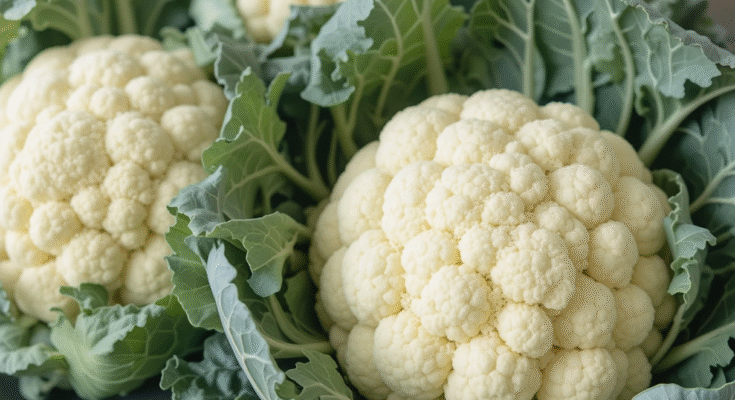🌟 Overview
Cauliflower is a highly nutritious vegetable in the Brassicaceae (cruciferous) family, closely related to broccoli, cabbage, and kale. While it may appear plain in color, cauliflower is a nutritional powerhouse — rich in fiber, antioxidants, and several key vitamins and minerals. Its versatility in the kitchen and disease-fighting compounds make it a favorite in plant-based and low-carb diets.
🧬 Nutritional Profile (Per 1 cup cooked – Approx. 155g):
-
Calories: ~30
-
Fiber: 3g
-
Protein: 2.5g
-
Vitamin C: 77% of Daily Value (DV)
-
Vitamin K: 20% of DV
-
Folate (Vitamin B9): 14% of DV
-
Vitamin B6: 12% of DV
-
Choline, Potassium, Magnesium, Phosphorus – moderate amounts
-
Antioxidants: Glucosinolates, sulforaphane, flavonoids, carotenoids
💚 Health Benefits of Cauliflower
1. Rich in Antioxidants
Cauliflower contains glucosinolates and isothiocyanates, sulfur-containing compounds that protect cells from inflammation and oxidative stress. These antioxidants are known to help reduce the risk of chronic diseases like cancer and heart disease.
2. Supports Heart Health
Compounds like sulforaphane help lower blood pressure and improve blood vessel function. Additionally, its fiber content helps reduce cholesterol levels, further supporting cardiovascular health.
3. Aids in Digestion
Cauliflower is an excellent source of dietary fiber, which promotes healthy digestion by feeding beneficial gut bacteria and preventing constipation.
4. Promotes Weight Loss
Low in calories and carbs but high in fiber and water, cauliflower promotes fullness and reduces overall calorie intake. It’s widely used as a substitute for high-carb foods like rice, mashed potatoes, and pizza crust.
5. May Help Prevent Cancer
Sulforaphane in cauliflower has been extensively studied for its anti-cancer effects, especially in preventing cancers of the colon, breast, lung, and prostate by inhibiting the growth of cancer cells.
6. Supports Brain Health
Cauliflower is a good plant source of choline, a nutrient essential for brain development, neurotransmitter function, and maintaining the integrity of cell membranes.
7. Boosts Immunity
With over 75% of your daily vitamin C in just one cup, cauliflower helps strengthen the immune system, accelerate wound healing, and fight off infections.
8. Regulates Hormones and Detoxification
The glucosinolates in cauliflower help the liver neutralize and eliminate toxins, while also playing a role in balancing estrogen levels in the body — important for hormone health.
9. Supports Bone Health
Cauliflower provides vitamin K and phosphorus, both of which are vital for building and maintaining strong, healthy bones.
10. May Help Manage Diabetes
Cauliflower has a low glycemic index and its fiber slows down sugar absorption in the bloodstream, helping regulate blood sugar levels — a key for managing type 2 diabetes.
🥗 How to Use Cauliflower
-
Raw: Add florets to salads or serve with dips.
-
Steamed/Roasted: Toss with olive oil and herbs for a hearty side dish.
-
Mashed: A low-carb alternative to mashed potatoes.
-
Riced: Grate or process into a rice-like texture for stir-fries or bowls.
-
Baked: Use in cauliflower crust pizza or veggie patties.
📝 Pro Tips:
-
Don’t discard the leaves and stem — they’re edible and nutrient-dense.
-
Pair with turmeric or black pepper to boost its anti-inflammatory benefits.
📌 Final Thoughts
Cauliflower is a truly versatile vegetable that offers impressive health benefits — from aiding digestion and weight loss to reducing cancer risk and enhancing brain function. Its neutral flavor and texture make it easy to incorporate into any meal for a healthy boost.



